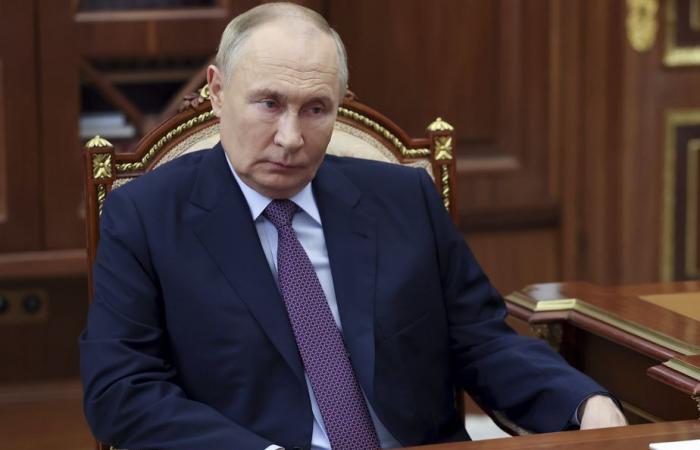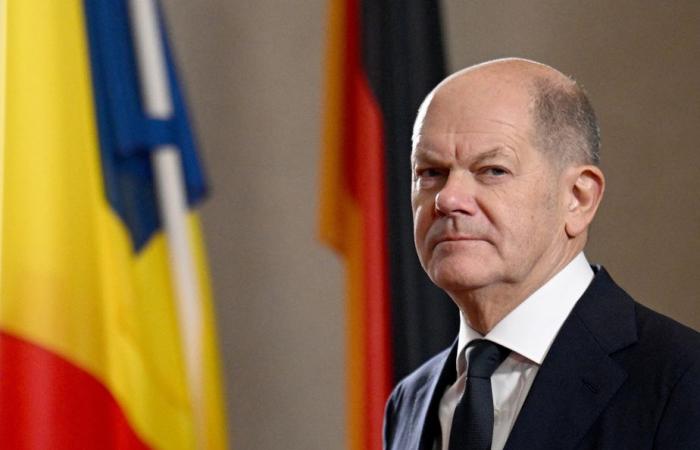(Berlin) On the occasion of their first call in almost two years, Olaf Scholz and Vladimir Putin reaffirmed their positions on the Ukrainian conflict on Friday: the German chancellor called on Moscow to negotiate “a just peace” and the Russian president insisted on territorial concessions from Kyiv.
Posted at 12:08 p.m.
This exchange angered Ukraine, which saw it as “an attempt at appeasement” towards Moscow.
During this one-hour interview, Olaf Scholz asked Russia to show its “willingness to begin negotiations with Ukraine with a view to a just and lasting peace”, according to a press release from the German government.
Vladimir Putin reaffirmed that any peace agreement should reflect “new territorial realities”, according to the Kremlin.
This is the Russian position repeated for months. Russia is open to peace negotiations, but with “concessions” from Kyiv: the cession of the Ukrainian territories that Moscow annexed in 2022 without fully controlling them. A condition deemed unthinkable by Kyiv.
The chancellery clarified that Olaf Scholz had previously spoken with Ukrainian President Volodymyr Zelensky and that he would speak to him again after his meeting with the Russian president.
PHOTO ANNEGRET GREETINGS, REUTERS
German Chancellor Olaf Scholz
“Conversations with the Russian dictator alone do not bring any added value to achieve a just peace,” criticized the spokesperson for Ukrainian diplomacy, Georgii Tykhy, calling instead for “concrete and strong actions” to force Russia to peace.
Allies informed
Washington, Paris and London knew of Olaf Scholz’s intention to call the Russian leader without the messages having been “coordinated”, according to those close to French President Emmanuel Macron.
Berlin “has ensured or will ensure” that its EU and NATO allies are informed of this exchange, the chancellery said.
Olaf Scholz will notably meet the G20 leaders on Tuesday during the summit organized in Brazil and a meeting of several heads of EU diplomacy is planned for the same day in Warsaw to mark the thousand days of the Russian invasion in Ukraine.
In a first comment on Friday, the head of the Polish government Donald Tusk welcomed the fact that Olaf Scholz had told Mr. Putin that “nothing about Ukraine” would be done “without Ukraine”.
The German Chancellor also reiterated to the Russian leader “the determination” of Germany and the EU to support Ukraine “as long as necessary”.
The last call between the German and Russian leaders was on December 2, 2022, some 9 months after the start of Moscow’s offensive in Ukraine on February 24, 2022.
According to the Kremlin, which described the exchange as “frank and detailed,” the call took place “at the initiative of the German side.”
Since the Russian invasion, Germany, Russia’s historic energy partner, has been the second largest supplier of military aid to Kyiv, after the United States.
But despite repeated requests from Volodymyr Zelensky, Chancellor Scholz tirelessly refused to provide Kyiv with the long-range Taurus missiles requested by Kyiv to better defend itself.
Election campaign
This fear of an escalation with Moscow, regularly put forward by the German leader, also earns him criticism from some of his European allies who criticize him for his lack of determination.
They add to concerns about a possible American disengagement from Ukraine after the election of Donald Trump to the White House, who had promised to resolve the Ukrainian conflict “in twenty-four hours”, without never detail his plan.
For his part, Olaf Scholz recently called for increased efforts to end the conflict diplomatically, in consultation with Kyiv and the country’s allies.
In mid-October, he judged that the time had come “to do everything — in addition to clearly supporting Ukraine — to find a way to prevent this war from continuing.”
“There will never be decisions taken over Ukraine’s head, and never without consultation with our closest partners,” he assured.
Military and financial support for Kyiv and Germany’s defense policy will be one of the subjects of the electoral campaign which should lead the country to early legislative elections on February 23.







